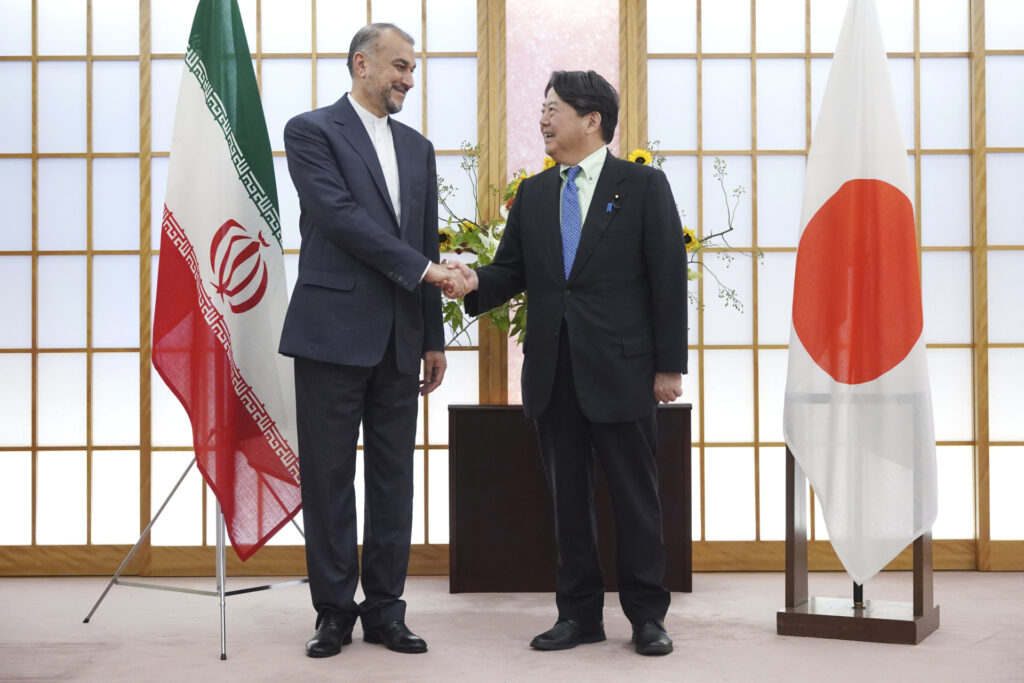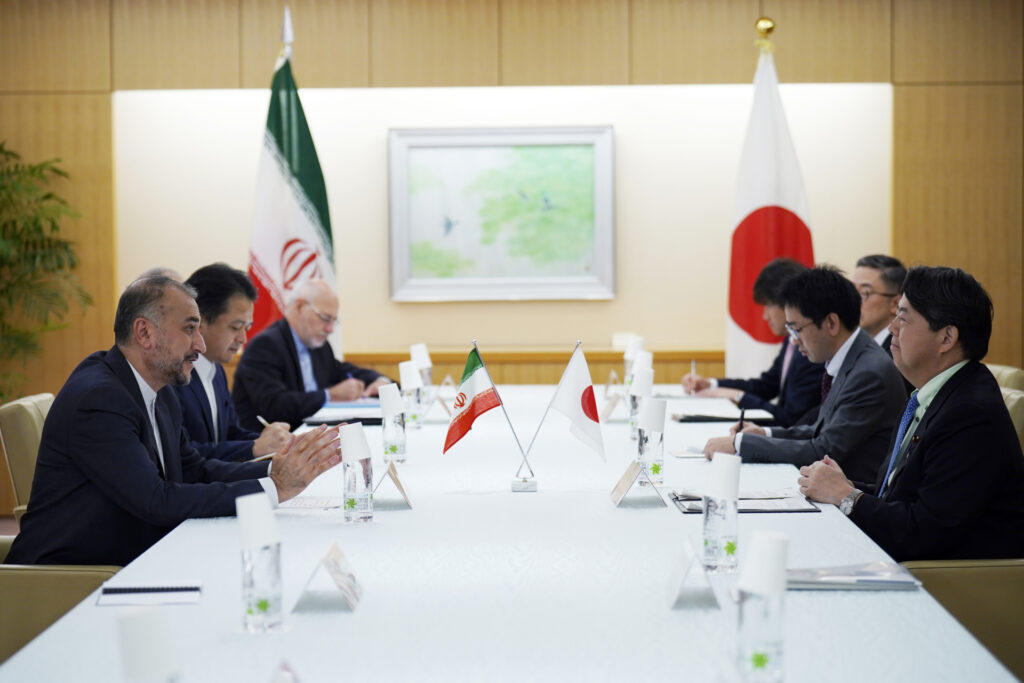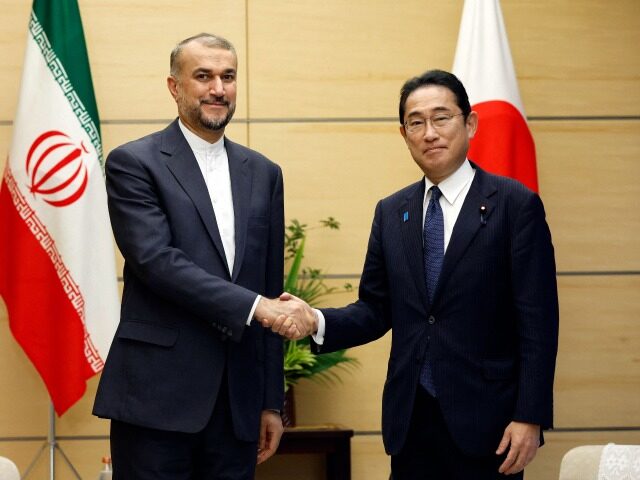Iranian Foreign Minister Hossein Amir-Abdollahian arrived in Japan on Monday with a somewhat enigmatic agenda that reportedly includes a meeting with Prime Minister Kishida Fumio.
Amir-Abdollahian met with Japanese Foreign Minister Hayashi Yoshimasa upon arriving in Tokyo. At a press conference afterward, the Iranian visitor hinted that part of his agenda includes allegations that Iran has been supplying Russia with drones for use in Ukraine.

Japanese Foreign Minister Hayashi Yoshimasa (R) and Iranian counterpart Hossein Amir-Abdollahian shake hands before their meeting on August 7, 2023, in Tokyo, Japan. (AP Photo/Eugene Hoshiko)
“We consider NATO and its provocations among the root causes of the war and crisis. We continue our efforts to stop the war and make the parties focus on a political solution,” Amir-Abdollahian said.
“We don’t pick a side in any war,” he insisted, vowing that Iran “has never provided drones to any country for use in Ukraine.”
Ukrainians and U.S. intelligence beg to differ. On Friday, the U.S. Defense Intelligence Agency (DIA) invited foreign officials to examine what it called “clear and undeniable” evidence that Iran is supplying Russia with suicide drones, including debris from several Iranian Shahed-series drones shot down by the Ukrainians, compared with a nearly identical Iranian drone recovered intact in Iraq.
A DIA analyst demonstrated to reporters and foreign dignitaries that components from the drones downed in Ukraine “fit perfectly” into the intact Iranian drone discovered in Iraq like they were “pieces in a puzzle.”
The drone debris from Ukraine also boasted serial numbers with identical positions and formatting to the Shahed drone from Iraq, and they used the same “honeycomb” fiberglass fuselage construction, a distinctive feature of Iranian unmanned aerial vehicles (UAV).
A DIA analyst told NBC News on Friday:
In Ukraine, the Russians rarely use the Iranian drones in combat and instead target buildings in cities to sow terror, deplete Ukraine’s air defenses, and damage electricity or water plants, the analyst said. The drones are launched in batches of more than 20 at a time, and the buzz of the drones’ propeller engine resembles the sound of a moped or a lawn mower.
The DIA said Iran’s cooperation with Russia is “deepening” and apparently includes Russian technicians helping Iran develop space vehicles and intercontinental ballistic missiles (ICBMs).
In June, the White House published satellite photos of what it described as an Iranian drone factory under construction in Russia’s Alabuga special economic zone, east of Moscow. Once it becomes operational next year, the factory could “dramatically increase” Russia’s supply of Iranian-made drones, according to the DIA.
Japan entertaining the Iranian ambassador would appear to run contrary to the Biden administration’s desire to put maximum pressure on Tehran to stop allegedly supplying the Russian war machine with drones. The Associated Press (AP) reported that Japanese Foreign Minister Hayashi took a much softer touch with Amir-Abdollahian, asking the Iranians to “act constructively” and giving the Iranian foreign minister a platform to respond.

Japanese Foreign Minister Hayashi Yoshimasa (R) and Iranian counterpart Hossein Amir-Abdollahian (L) speak during their meeting on August 7, 2023, in Tokyo, Japan. (AP Photo/Eugene Hoshiko)
The AP reported:
Iran’s state television said Amir-Abdollahian denied providing drones to Russia and insisted Tehran is focused on efforts for dialogue and finding a political solution to end the war. The report also quoted the top Iranian diplomat as saying the United States and the West should stop what he described as baseless accusations against Iran.
Amir-Abdollahian also thanked Japan for supporting the moribund Joint Comprehensive Plan of Action (JCPOA), former President Barack Obama’s disastrous “nuclear deal.” Iran has violated the JCPOA with giddy abandon, making it politically impossible for even the desperate Biden administration to revive it. Iran now has impressive stockpiles of near-weapons-grade nuclear material and a new underground base in which to process it.
The Japan Times quoted Hayashi expressing “serious concerns” about the rampant expansion of Iran’s nuclear missile program and asking for “complete and unconditional cooperation” with the International Atomic Energy Agency (IAEA).
“Japan holds this year’s presidency of the Group of Seven nations, which have maintained economic sanctions on Russia over its war against its neighbor since February last year. Tokyo aims to leverage its traditional friendship with Tehran to help end the war,” the Japan Times said hopefully.
Agence France-Presse (AFP) explained that Iran was once a “major oil exporter to resource-poor Japan,” but sanctions imposed before the nuclear deal — and resumed after former President Donald Trump withdrew from the JCPOA in 2018, citing Iranian non-compliance — disrupted Japan’s oil trade with Tehran.
Iran International, a U.S.-based opposition news site, suggested a major reason for Amir-Abdollahian’s visit to Tokyo was persuading Kishida’s government to unfreeze some $3 billion in Iranian funds frozen in Japanese banks. Iran is also trying to get South Korea to unfreeze $7 billion frozen by U.S. sanctions.
Iran International noted on Monday that while official readouts of Amir-Abdollahian’s meetings in Tokyo did not mention the frozen funds, the Iranian Foreign Ministry said the subject was on Amir-Abdollahian’s agenda.
According to Iranian Foreign Ministry spokesman Nasser Kanaani, “The Japanese government has repeatedly announced its readiness to repatriate the frozen assets and is making efforts to make this happen.”

COMMENTS
Please let us know if you're having issues with commenting.